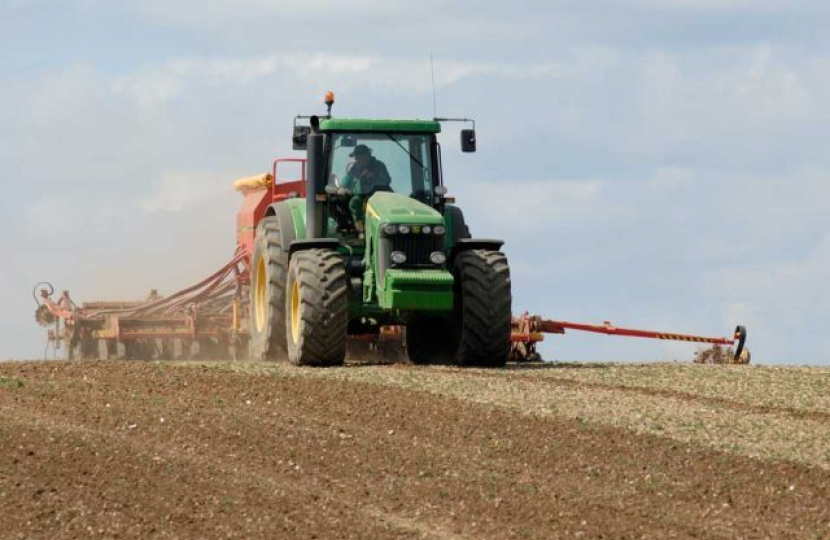
Having worked consistently on the agricultural and environmental agendas both prior to becoming the MP for Taunton Deane and subsequently in Westminster, I take all the comments I have received raising concerns over possible changes to the Environmental Land Management Scheme extremely seriously.
Food production and environmental sustainability should go hand in hand. Healthy ecosystems are critical in enabling sustainable, heathy, secure supplies of food to be produced.
The ELMS scheme, together with the Sustainable Farming Initiative has been developed using data from hundreds of pilots run with thousands of farmers, scientific analysis, and engagement with a wide range of interested parties. The main aim is to offer schemes that will pay farmers to deliver public goods such as clear water, flood control, improved soil, pollinator strips to increase insects all of which improve ecosystems which of course will ultimately result in spin offs for healthy food production. Other options will encourage farmers to move away from conventional chemical pest control and towards bio-controls and integrated pest management. It is a huge opportunity to create our own bespoke system that delivers environmental benefits compared to the previous Common Agricultural Policy that simply paid those with land for owning it. It did little for nature and indeed little for the farming community given that half of the funding went to the 10% largest farms.
Critically, nature is in free fall in the UK, sadly we have become one of the most nature depleted countries in the world with just half of our biodiversity remaining. https://www.nhm.ac.uk/press-office/press-releases/natural-history-museum-reveals-the-world-has-crashed-through-the.html. This is directly relevant to food security. The Governments’ food security report in December 2021 https://assets.publishing.service.gov.uk/government/uploads/system/uploads/attachment_data/file/1077015/United_Kingdom_Food_Security_Report_2021_19may2022.pdf, found that environmental decline including soil, water and biodiversity degradation, was the gravest medium to long term threat to domestic production. The only way to mitigate this is to make farming more sustainable.
The framework is in place for this with Government having committed to net zero by 2050 and having set a legally binding target to halt species decline by 2030 through the passing of the ground-breaking Environment Act which I was proud to steer through Parliament as the then Environment Minister. The ELMS scheme will be essential to meeting these targets. Other schemes, the Local Nature Recovery and Landscape Recovery schemes will pay farmers for habitat creation, maintenance, and restoration of unproductive land. The schemes aim to bring 60% of England’s agricultural soils under sustainable management by 2030 and restore up to 300,000 ha of wildlife habitat, largely on the poorest most unproductive land by 2042. Quite clearly there should not be a conflict with land needed to produce food. Already 60% of our agricultural output comes from 30% of our land, whilst only 3% of food is produced on the least productive 20%. The ELMS schemes plan to restore habitat across just 2.5% of England largely on the rough margins. Arguably food security concerns would be better focused on the 250,000 acres of our most productive land used to grow crops for bioenergy reactors and other markets.
I reiterate, that nature restoration and food production should go hand in hand. Ecological restoration will improve soil fertility and increase pollinators, reducing the need for costly artificial fertilisers and protecting long term food security.
Importantly environmental improvements will open up new income streams for farmers. There is growing private sector demand for environmental improvements to comply with environmental regulations and targets. Selling carbon or biodiversity credits to private buyers alongside traditional food production offers farmers diversification options that can increase their profitability and resilience. Stalling the ELMS scheme will mean that these opportunities may be held back.
An emphasis on technology and innovation is also important, there are already Government grants available and an increased focus on this will be important in conjunction with the environmental payments to ensure we have a resilient food producing sector and vibrant rural communities benefitting.
In conclusion, we must not back track on the incredible progress we have made on this agricultural and environmental agenda which is inextricably linked. Farmers own and manage 70% of our land and are therefore an absolute key to delivering both a restored environment and the essential, secure food supplies we need. I have been making this view clear in articles to the press, in a signed letter to the Times https://twitter.com/CEN_HQ/status/1574709007679619073 and directly with the Prime Minister and DEFRA Ministers.
Rest assured I have taken your comments on board. Thank you for getting in touch.
Kind regards,
Rebecca
